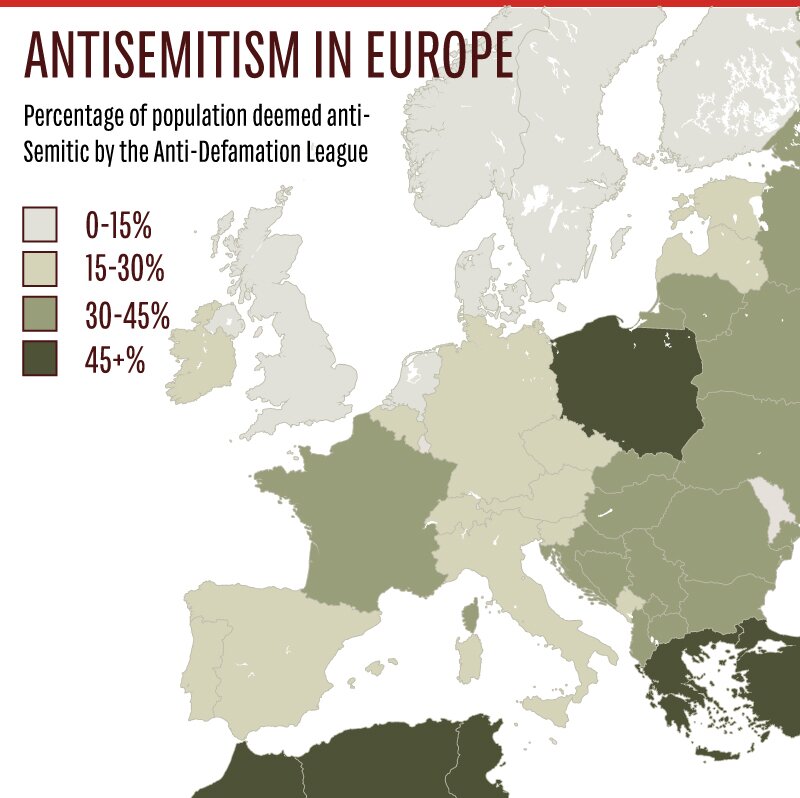
Is Anti-Semitism Extinct?
For those of us living in English-speaking nations, anti-Semitism is something we rarely see outside history class. It happens sometimes—perhaps from a raving drunk on a train or some nutter in an online comment—but we’re not used to it. So we think of anti-Semitism as an historical phenomenon. We know it was a problem 100 years ago, and we marvel that so many ordinary people got caught up in what seems like a bizarre conspiracy theory. To us, though, it is a problem for the historian, not for the modern man.
But we’re wrong. The English-speaking countries are, in fact, in a bizarre bubble, with completely different attitudes toward Jews than the rest of the world. In reality, anti-Semitism is still a major problem today.
The Statistics
The Anti-Defamation League (adl) published the results of a global survey of over 50,000 adults in over 100 different countries on May 13, which exposes this unsettling reality. The study concluded that 26 percent of the globe’s adult population harbored anti-Semitic attitudes. That’s over 1 billion adults worldwide.
But in the English-speaking world, only 13 percent harbored anti-Semitic attitudes. In the United States, it is 9 percent; the United Kingdom, 8 percent. Compared to the rest of world, our experience is unusual.
Some surveys that yield shocking results on this subject set a pretty low bar for defining anti-Semitism—but not this one.
The adl measured anti-Semitism by stating 11 stereotypes about Jews. Those who said that at least 6 of the statements were “probably true” were classed as harboring anti-Semitic attitudes. The stereotypes were:
It is debatable whether harboring just one of these views on its own would make someone anti-Semitic. Someone may think, for example that “Jews are more loyal to Israel” than their own nation without having anything against Jewish people. But if someone says “probably true” to six of these statements, there’s no question: They are anti-Semitic.
Examining these statements in more detail continues to reveal a sharp contrast between the English-speaking nations and the rest. Nearly in one in four people around the world said that “Jews are responsible for most of the world’s wars.” In Britain and America, it was only 1 in 17. One third of those surveyed globally said that “Jews don’t care what happens to anyone but their own kind.” In Britain and America, only about 10 percent agreed.
Europe Is Different
This split between the English and non-English speakers is not just because the English-speaking nations tend to be richer—as Europe clearly demonstrates. The Nordic countries generally have a low level of anti-Semitism. Sweden, at 4 percent, has the lowest level in Europe, followed by the Netherlands. But other countries are shockingly high.
In Greece, 69 percent are anti-Semitic, according to the adl’s test. In France, it is 37 percent. Even in Germany that figure is 27 percent. While only 8 percent in Britain have anti-Semitic attitudes, just next door in Ireland that figure is 20 percent. Overall, one in four people in Western Europe showed anti-Semitic attitudes—only slightly under the global average.
In Eastern Europe that figure is even worse: one in three. In Poland, Bulgaria, Serbia, Hungary, Belarus and Ukraine, roughly 40 percent fail the adl’s anti-Semitic test.

America’s neighborhood is similar. While anti-Semitism is rare in America and Canada, you don’t have to travel far to find societies where it is widespread. In Mexico, 24 percent exhibited anti-Semitism. In Panama, the majority do. Colombia and the Dominican Republic are not far behind.
Even other wealthy nations score far worse than America. In South Korea, over half of the population shows anti-Semitic attitudes. India and China, the world’s two most populous countries are slightly below average, but still at the high level of 20 percent.
The Middle East
In the Middle East and North Africa, the numbers get truly shocking. Across the whole region, the rate of anti-Semitism is 74 percent—three quarters of the population. The least anti-Semitic nation in the whole region is Iran (Israel was not included in the survey, though Gaza and the West Bank were). There, “only” 56 percent of the population were anti-Semitic, according to the survey.
Even countries relatively friendly to Israel, like Jordan and Saudi Arabia, are just as bad as the rest of the Middle East.
In the rest of the world, the more educated a person is the less likely he is to have anti-Semitic attitudes. But in the Middle East and North Africa, this is reversed.
In this region, 65 percent said Jews are responsible for most of the world’s wars. Think what that means. If you were to pick someone at random off the streets of Egypt, Turkey or Kuwait, more likely than not he would believe that the world is controlled by a secret cabal of Jews who callously plot wars and mass death for their own benefit.
This world view is so alien to us that we struggle to accept it. But this is how most people in the Middle East see events. It seems crazy, but they’ve been steeped in that view their entire lives.
Does It Matter?
One final disturbing trend highlighted by the adl’s report is that the world is forgetting the Holocaust. Across the globe, only one in three had heard of the Holocaust and believes that is has been accurately described in history. In other words, the vast majority of the world either does not know about the Holocaust, or believes that a large part of what they have heard is fictitious.
To sum up, around the world, hundreds of millions harbor an irrational hatred of Jewish people. Meanwhile we’re losing the memory of what happened last time that hatred was allowed to become national policy.
The nation of Israel faces the most obvious danger from this. Its survival relies on having at least informal alliances with at least some of the nations around it. But can this last when three quarters of those living in these nations hate Jews? How much can Israel trust Europe for help when, in most European nations, one in three or four is anti-Semitic?
Meanwhile, Jews in Europe are already suffering. In the first three months of this year, three times as many Jews left France as in the same period in 2013. The rapid rise of the extremist National Front party of Marine Le Pen means that anti-Semitism is taking its first baby steps toward being institutionalized. In towns that her party controls, Jewish and Muslim school children will be forced to eat pork or go without.
It’s small persecution compared to what Jews have been forced to endure over the centuries, though it evokes memories of London restaurants baring those with “dietary requirements” from their premises in the 1930s as a way of excluding Jews. Persecution in Europe comes more from terrorist attacks, often by Muslim immigrants, than the authorities.
There is, however, a wider danger. What does it say about Europe’s society when one in three think that Jews have too much power in international finance and global affairs? If that many buy into this conspiracy theory, how many more hold strange but slightly less ridiculous views about economics and finance? No wonder so many economic rules and regulations coming out of the EU seemingly make no sense and are counterproductive. A vast chunk of the population sees the world of finance as some kind of secret machination where rich bankers control the world—hardly a solid foundation for logical decision making.
This is merely the mildest expression of the danger.
All around the world, one in four people believe Jews are responsible for most of the world’s wars. The events we see on the news are, to them, part of a vast Zionist conspiracy. It is a world view completely void of logic and based instead on emotion and, often, hatred. In the Middle East, it’s a hatred cultivated from earliest childhood.
When Hitler came to power, blaming all of his nation’s problems on the Jews, it wasn’t only the Jews who suffered. Sixty million died in World War ii. An unhinged world view led to an unhinged foreign policy. And we can see this unhinged world view firmly entrenched around the world today.

But it’s a world view the English-speaking world has long rejected. So we assume the rest of the world has done the same. And we assume that wars and the desire for conquest that go hand-in-hand with this world view are gone too—that they’re confined to our history books.
The adl’s study should be a wake-up call. There’s a huge amount of hate out there, and much of it targeted at Israel. All that hatred is a profound danger. When the right man harnesses it, far more than the nation of Israel will suffer.
